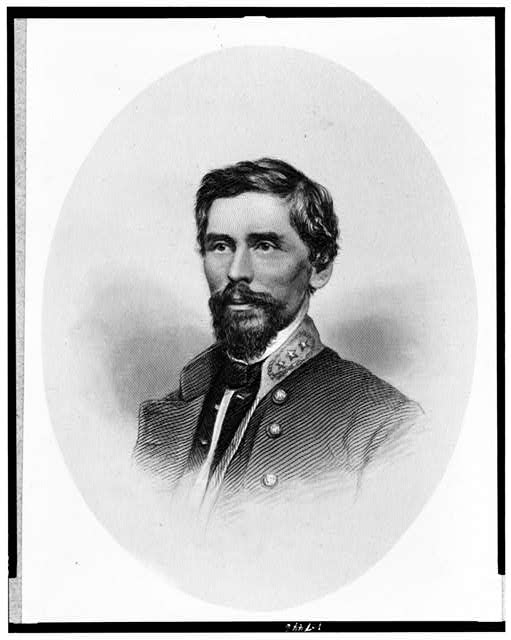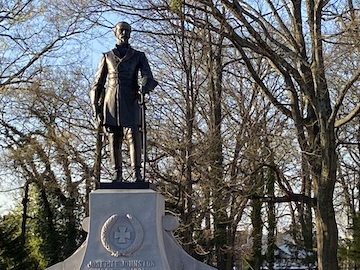Things I have learned on the way to Atlanta – The other proposal

Many – perhaps most – of the readers of this blog will have heard of Patrick Cleburne’s famous and extremely controversial proposal to enlist slaves directly into the Confederate army, in exchange for their and their loved ones’ emancipation. In fact, realizing the effect that even a partial emancipation would have on the institution, Cleburne went a step farther, noting that if “we touch the institution at all we would do best to make the most of it . . . by emancipating the whole race.” Though a few officers privately offered up support, to most, Cleburne’s proposition was a bombshell.[1]

Cleburne’s idea was quickly quashed, with many fearing complete disorder and demoralization across the South if word of it were widely leaked. In fact, it was widely leaked, and civil disorder did not follow, but the proposal never stood a chance of becoming reality.
But I think fewer know of the “other” proposal – this one authored by Joseph E. Johnston on the same day as Cleburne’s radical idea.

On January 2nd Johnston informed Davis that he could increase his combat power “at once [by] 10,000 or 12,000 men.” He wanted to directly draft or recruit slaves. Doing so would require “judicious legislation” giving the army the power “to take negroes” for such duties, “giving the slave a portion of the pay and punishing the master for not returning him if he deserts.” Johnston also privately pitched the idea to Senator Wigfall, with whom he had developed a warm correspondence, hoping to muster political weight for a rapid passage, and perhaps, to bypass Davis if the President proved unenthusiastic. As he told Wigfall: “If you can devise and pass a law to enable us to hold slaves and other negroes with armies, this one can, within a few weeks, be increased by the number given above—of soldiers—not conscripts. Is not this worth trying?”[2]
For Johnston (who was not a slaveholder, though raised in a family that owned slaves) the potential increase in fighting strength was well worth the economic pain and potential loss of property. He felt that he was not blurring any line between slaves and soldiers, since, after all, there were already many negroes with the army; servants, common laborers, teamsters, blacksmiths, and many cooks. The War Department authorized payment for such services either to the slaveholder or directly to any hired freedman. The key difference in Johnston’s proposal was that now, a portion of any payment would go to the slave, not his owner. To Wigfall, Johnston insisted that “it puts soldiers and negroes each in his appropriate place; the one to fight, the other to work.” However, by paying the slaves a portion of their own wage, as well as by drafting slaves (and “other negroes,” presumably freedmen) for longer terms of service, he was indeed blurring that line.[3]
Johnston’s proposal also died a quiet death, perhaps because it was so near to Cleburne’s idea. It is also possible that Johnston hoped that a watered-down version might well be accepted. He never said.
Sources:
[1] Craig L. Symonds, Stonewall of the West: Patrick Cleburne & the Civil War (Lawrence, KS: 1997), 186-189.
[2] OR 32, pt. 2, 511; Mrs. D. Giraud Wright, A Southern Girl in ’61. The War-Time Memories of a Confederate Senator’s Daughter (New York: 1905), 168.
[3] Wright, A Southern Girl in ’61, 169.
The Confederacy wasn’t in the emancipating slave business, even if helped the war effort.
First off, this article is a good summary of a lesser known piece of history of the war and I’m definitely saving it.
The statement and argument you put is not necessarily correct, at all. As cited on this page in the past, the 1862 near-clinched Emancipation Treaty between the Confederacy, Great Britain and France demonstrates that the former certainly did have the willingness to undergo emancipation. The Duncan F. Kenner Mission in the winter of 1864-65 proves the point again.
What an interesting post this is. We often indulge in what if’s. In this case, there is a real life what if to contemplate. At the same time that Cleburne & Johnston grappled with the slave / soldier conundrum, much farther south somebody reached a similar conclusion. Pedro II, Emperor of Brazil, during the War of the Triple Alliance 1864 – 1870, followed Johnston’s advice. He enlisted a slave army that assisted in the near extermination of Paraguay’s male population… perhaps a cautionary tale there, as well.